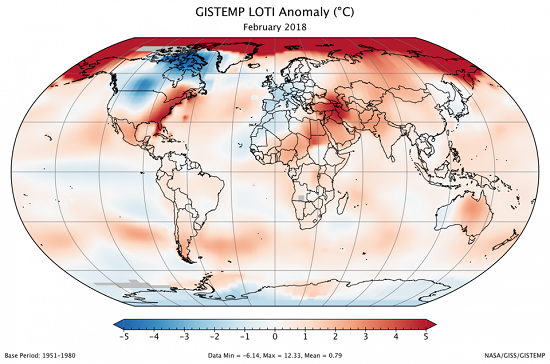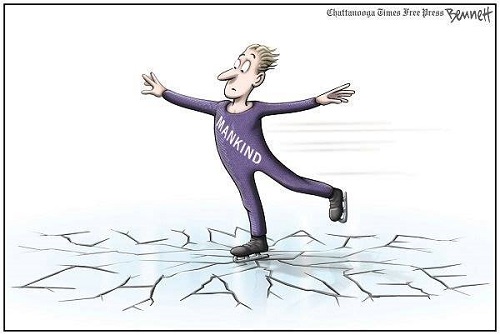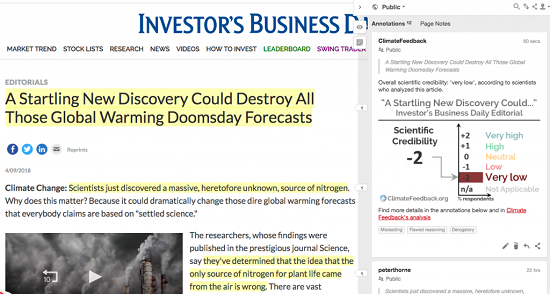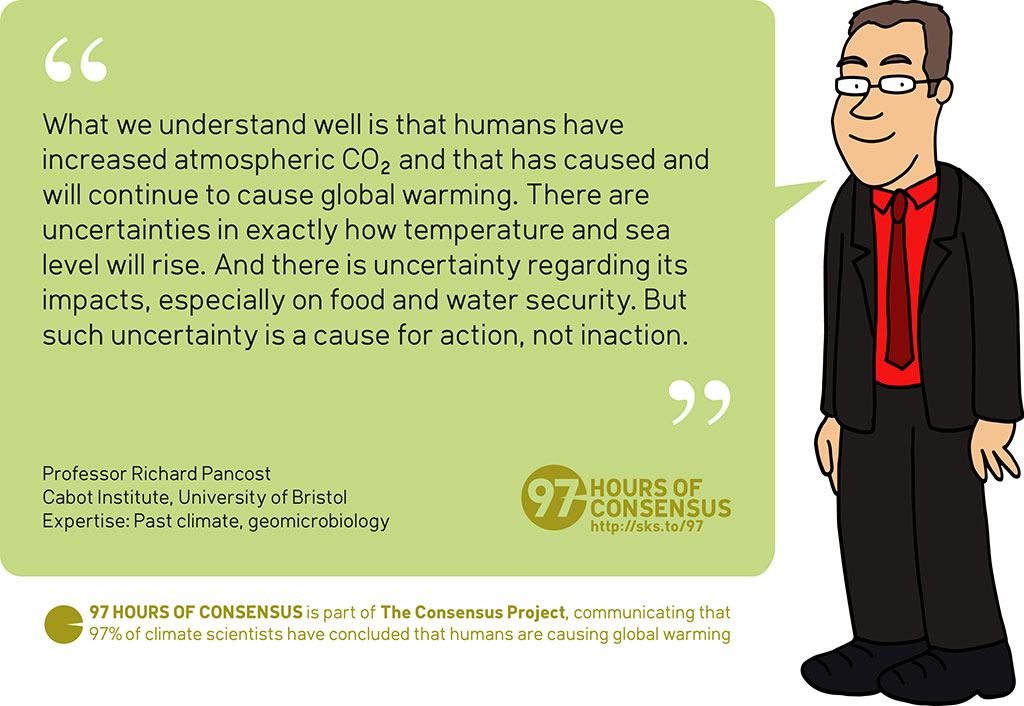
Story of the Week... Commentary of the Week... SkS Highlights... El Niño/La Niña Update... Toon of the Week... Quote of the Week... SkS in the News... SkS Spotlights... Video of the Week... Coming Soon on SkS... Poster of the Week... Climate Feedback Reviews... SkS Week in Review... 97 Hours of Consensus...

Social media is an interesting landscape of opinions, confirmation bias (consuming information that supports your beliefs), and expressions of the Dunning-Kruger Effect, a psychological term published in the literature that argues that people think they know more about topics than they actually do. This week two very worrisome but important climate change (or global warming) related studies were highlighted in the media. One study suggested an eastward shift in the well-known climate boundary near the 100-degree longitude line in the United States. This could have major implications for U.S. agriculture; productivity. The other study, actually two of them, revealed a slow down in a major ocean circulation that affects weather-climate patterns. In discussing both on Twitter, a few inevitable "Didn't they change the name to climate change because global warming wasn't happening" tweets appeared. While this is an oft-stated zombie theory, one that lives on though refuted by scientists, it is worth noting three reasons why you should not be distracted by this tactic.
Climate Change Or Global Warming? Three Reasons Not To Be Distracted By The Name Game by Marshall Sheperd, Science, Forbes, Apr 13, 2018

In the Trump era, deregulation and less federal interference was supposed to prevail at almost every turn, especially when it came to environmental protections. Fortunately, Congress has pushed back against proposed shrinking of federal responsibilities that would hit the type of environmentalism that’s supported by both Democrats and Republicans: energy efficiency.
Last month, the president signed a $1.3 trillion spending bill that funds the federal government for the rest of this fiscal year, which ends September 30. Federal agencies now have their full-year funding, allowing them to proceed with projects that already had been approved.
The legislation was surprisingly passed with votes from both sides of the aisle and in both chambers of Congress. Even more shocking is that the legislation broadly rejected the administration's proposals to downsize or even eliminate several important energy-related programs. And in some instances, the bill even provided more money than the Obama administration allocated.
Energy Efficiency: A Rare Bipartisan Consensus, Commentary by Taryn Holowka, Real Clear Politics, Apr 10, 2018
John Cook and Stephan Lewandowsky, who previously published The Debunking Handbook, teamed up with Sander van der Linden and Edward Maibach to write The Consensus Handbook. It’s a concise and definitive summary of everything related to the expert climate consensus, including how we know 90–100% of climate scientists agree on human-caused global warming, efforts to manufacture doubt about the consensus, its role as a gateway belief, its neutralizing effect on political ideology, and how to inoculate people against misinformation.
La Niña conditions prevailed through March, but it’s very likely the great La Niña of 2017–18 is a sinking ship. ENSO-neutral conditions are expected to arrive within the next couple of months, meaning sea surface temperatures in the central Pacific will return to near the long-term average.
April 2018 ENSO update: what lurks beneath by Emily Becker, NOAA's Climate.gov, Apr 12, 2018

The Harris County Flood Control District, the agency tasked with managing the area around Houston, is considering a gargantuan infrastructure plan to reduce the threat of future flooding. It would involve drilling massive stormwater tunnels 100 to 200 feet below the ground to funnel water directly to the Gulf of Mexico through a system of pumps. The idea isn’t winning over many urban planners, though.
“This strategy is like dumping water from an overflowing bathtub right back into the bathtub,” says Monica Rokicki-Guajardo, an urban design consultant who until recently was based at the University of Houston.
Gigantic water tunnels won’t save Houston from the next Harvey by Eric Holthaus, Grist, Apr 10, 2018
In his article, Inoculate by Teaching the Technique and Not Just the Error (JD Supra), Ken Broda-Bahm wrrote:
A recent study (Cook, Lewandowsky & Ecker, 2017) looked at arguments regarding consensus on human-created climate change, and specifically two techniques used by those wanting to play down that consensus: The “false balance” fostered by the media in typically inviting one expert on each side of the question, and the “fake expert’s” approach of creating lists of climate doubters consisting of commentators or academics who generally don’t have a background in climate science. The study found that explaining in advance what these techniques involve and why they might be misleading helped to neutralize the influence of misinformation. Researchers even addressed the boomerang tendency of climate skeptics to become more committed to that skepticism after hearing information supporting human-created climate change. Learning the why behind the techniques helped to neutralize that effect as well.
In their article, Sunday Shows Shirk Climate Experts After A Firestorm Week For EPA Chief Scott Pruitt (HufPost), Alexander C. Kaufman & Laura Bassett wrote:
Television has a long history of providing some of the worst coverage of climate change. Cable networks are more likely than newspapers and magazines to give as much time to industry-funded climate change denialists as they give to the 97 percent of peer-reviewed climate researchers who say rising global temperatures are caused primarily by fossil fuel emissions, according to John Cook, a research assistant professor at George Mason University’s Center for Climate Change Communication.
“It gets even worse when you look at partisan cable TV,” Cook told HuffPost by email. “Outlets like Fox News are heavily slanted towards climate science denial and are a strong source of misinformation about climate change.”
In his article, 97% consensus on climate change? More like 99.94%, study finds (ZME Science), Mihai Andrei wrote:
To portray this, the media often uses the phrase “97% consensus” — likely originating from a 2014 study by Cook et al. entitled “Quantifying the consensus on anthropogenic global warming in the scientific literature“. In the study, Cook analyzed 11,944 peer-reviewed papers published between 1991-2011. Out of them, about a third (4,013) expressed a position on man-made climate change, and 3,894 (or 97%) supported the position that humans are causing climate change. The authors also found that more recent papers were increasingly attributing climate change to mankind, indicating an increasing acceptance level.
The Consensus Handbook is highlighted and summarized by Rose Hendricks in her blog post, Scientists agree on climate change: How should we communicate that?.
The cryosphere is different, requiring different yet complementary climate solutions to those of the globe as a whole. ICCI will therefore seek to:
A focus on CO2 and successful Copenhagen and post-Copenhagen negotiations will remain the basis for any long-term efforts to preserve as much of the cryosphere as possible, and ICCI will serve as a strong advocate for CO2 efforts through highlighting the implications of CO2-driven cryosphere climate change for the globe. However, where other solutions seem indicated by the science, and for the near-term climate benefit required to address climate change in the cryosphere, ICCI will also work to bring these to light.
The ICCI timeline will focus on a five-year timeline of work, from 2010-2015; aiming in a sense to work itself out of existence by making cryosphere issues an integral part of the climate debate, and establishing organizational networks that become self-sustaining. Today, ICCI is registered as a non-profit in both Sweden and the United States (see “About ICCI”), with programs or initiatives related to the Arctic, Himalayas, Antarctica, and the Andes, as well as on global pan-cryosphere benefits (see more under “Programs.”)
What melting sea ice means for life in the Arctic by Eli Kintisch & Mallory Brangan, Energy & Environment, Vox, Apr 10, 2018

Investor’s Business Daily editorial misrepresents study to claim plants will prevent dangerous climate change

Climate Feedback asked its network of scientists to review the article, A Startling New Discovery Could Destroy All Those Global Warming Doomsday Forecasts, Editorial, Investors' Business Daily, Apr. 9, 2018
Five scientists analyzed the article and estimate its overall scientific credibility to be 'very low'.
A majority of reviewers tagged the article as: Derogatory, Flawed reasoning, Misleading.
This editorial by Investor’s Business Daily centers on a recent study published in Science, which concerns the sources of nitrogen cycling through Earth’s ecosystems. The editorial then claims that this study shows that plants will be able to soak up future human-caused emissions of carbon dioxide because nitrogen is plentiful, proving projections of rapid global warming wrong.
The first author of the new Science study, and other scientists who reviewed the editorial, explained that this is incorrect and poorly reasoned. If the editorial’s claims about nitrogen availability for plants were true, past CO2 emissions would also have had little effect on the concentration in the atmosphere. We know this is false—the concentration of CO2 in the atmosphere has been steadily increasing since daily measurementsbegan in 1958, and the Earth has warmed as a result.
Investor’s Business Daily editorial misrepresents study to claim plants will prevent dangerous climate change by Scott Johnson, Climate Feedback, Apr 12, 2018

Quote provided by email.
High resolution JPEG (1024 pixels wide)
Posted by John Hartz on Sunday, 15 April, 2018
 |
The Skeptical Science website by Skeptical Science is licensed under a Creative Commons Attribution 3.0 Unported License. |